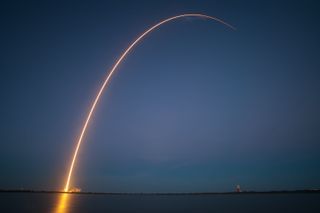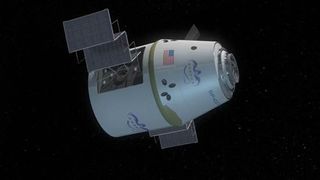SpaceX Poised to Launch Space Missions for US Air Force, Elon Musk Says

The private spaceflight company SpaceX wants to launch missions for the United States military, and soon it will be ready to do so, the firm's billionaire founder Elon Musk told a Senate subcomittee Wednesday (March 5).
SpaceX will be ready to compete for Air Force contracts using its new Falcon rocket soon, Elon Musk told a U.S. Senate Appropriations Subcommittee on Defense hearing. SpaceX currently flies missions for NASA and private contractors.
"Frankly, if our rockets are good enough for NASA, why are they not good enough for the Air Force? It doesn't make sense," Musk said. [6 Fun Facts About Private Rocket Company SpaceX]
SpaceX has now completed part of a major requirement to compete for Air Force Evolved Expendable Launch Vehicle (EELV) contracts with the company's upgraded Falcon 9 v1.1 rocket. In order to be considered for contracts, SpaceX needs to complete three successful launches of the new rocket.
The Air Force has already formally certified the upgraded Falcon's maiden launch on Sept. 29, 2013, and since then, SpaceX has completed two more launches with the new Falcon. Though the two successive launches have not been formally certified, officials do not expect any problems, according to a Space News report.

Musk is confident that SpaceX will be eligible to compete for 14 EELV launches in fiscal year 2015.
"I believe SpaceX can manage all of the Air Force requirements," Musk said. We might argue that maybe some of those requirements shouldn’t be there, but we will meet whatever requirements the Air Force asks of us. We believe that we can manage all of the Air Force's satellites and then some."
Get the Space.com Newsletter
Breaking space news, the latest updates on rocket launches, skywatching events and more!
At the moment, the Air Force use the Atlas 5 and Delta 4 rockets built by United Launch Alliance to launch their payloads into space. The private company is a collaboration of Lockheed Martin and Boeing, two major competitors for Air Force launch contracts before they created the joint venture in 2006.
"I think, as a country, we've generally decided that competition in the free market is a good thing, and that monopolies are not good," Musk said. "The reality is, when competition is introduced, reliability is a key factor in competition. That would be a deciding factor in who wins what launches. It doesn't become less important, it becomes more important. The cost to the tax payer will drop substantially."

"I think it's fair to say that NASA doesn't have the same policy requirements for assured access to space that DoD [Department of Defense] does," Pace said. "I dealt, when I was at NASA, with a lot of the science mission community, and they were plainly opportunistic. They would buy the most reliable vehicle they could at least cost, but they did not have the same policy imperatives for assured access to space for all their payloads that DoD does."
Follow Miriam Kramer @mirikramer and Google+. Follow us @Spacedotcom, Facebook and Google+. Original article on Space.com.
Join our Space Forums to keep talking space on the latest missions, night sky and more! And if you have a news tip, correction or comment, let us know at: community@space.com.

Miriam Kramer joined Space.com as a Staff Writer in December 2012. Since then, she has floated in weightlessness on a zero-gravity flight, felt the pull of 4-Gs in a trainer aircraft and watched rockets soar into space from Florida and Virginia. She also served as Space.com's lead space entertainment reporter, and enjoys all aspects of space news, astronomy and commercial spaceflight. Miriam has also presented space stories during live interviews with Fox News and other TV and radio outlets. She originally hails from Knoxville, Tennessee where she and her family would take trips to dark spots on the outskirts of town to watch meteor showers every year. She loves to travel and one day hopes to see the northern lights in person. Miriam is currently a space reporter with Axios, writing the Axios Space newsletter. You can follow Miriam on Twitter.
